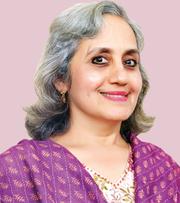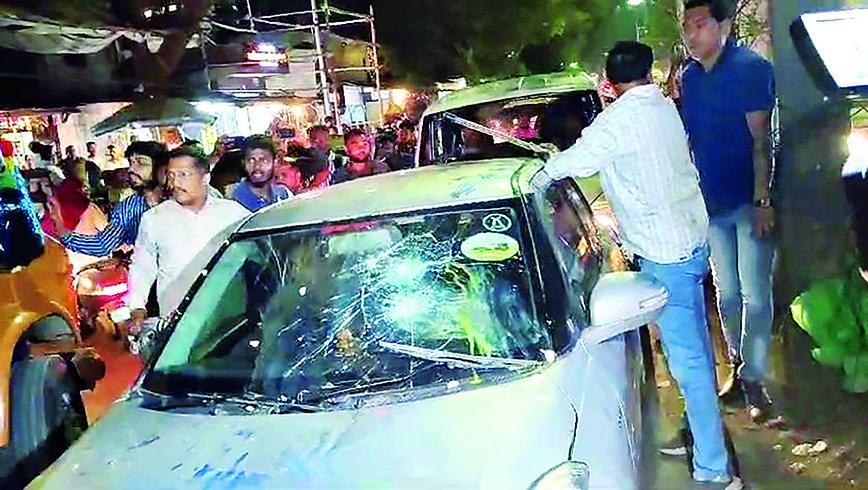
RAJNI BAKSHI
BE Fearless is a compelling, timeless but difficult call. When you are confronted by a hostile mob that is determined to harm you, the dominant biological impulse might well be to flee rather than fight. What enables someone to stand their ground — neither flee nor cower in fear nor retaliate using the methods of the violent mob?
Nikhil Wagle’s life and work offer many clues and answers to this question. The highly reputed journalist from Maharashtra has had to deal with far more than his fair share of life-threatening situations.
On February 9, Wagle’s car was attacked as he drove towards a public meeting in Pune, where he was to speak. Workers of the BJP had publicly warned that they would not allow the meeting to proceed because Wagle had made critical comments about Prime Minister Modi and L.K. Advani, which they found objectionable.
Several police personnel arrived at the location, where Wagle was staying, and tried to dissuade him from going to the meeting. When he insisted on proceeding with his plans and emerged from the building, BJP workers threw ink at Wagle and broke the rear windshield and some windows of the car — even as his supporters tried to dissuade them and push the attackers back.
Wagle later told website Newslaundry that though he had faced violent attacks before this was different: “It was a mob lynching attempt on me. It was traumatic. It was a narrow escape from death…I am still in shock because of the intensity of the attack and the hate.”
A week later Wagle was busy organizing ‘Nirbhay Bano’ or ‘Be Fearless’ meetings. This is also what he did in the mid-1990s when the office of his newspaper, Mahanagar, was attacked and ransacked by Shiv Sena workers because the paper was openly critical of the party’s politics and its leader, Bal Thackeray.
For several months Wagle and Ratnakar Matkari, a noted Marathi playwright and director, organized public meetings in defiance of the Shiv Sena’s threat to disrupt them. It was significant that most of these meetings attracted a large audience, presumably people who were keen to be part of his Be Fearless campaign.
Journalism is an extension of Wagle’s activism, which dates back to his youth. He was a part of the Rashtra Seva Dal, a Gandhian Socialist organization that has strong roots in Maharashtra. It was thus natural that Wagle was among those young people who responded to Jayaprakash (JP) Narayan’s call for ‘Total Revolution’. Like many others, Wagle dropped out of college to join the JP movement in Bihar. Later he led the youth wing of the Rashtra Seva Dal in Mumbai.
When Wagle began looking for a job in journalism, in the early 1980s, none of the mainline papers would hire him because he did not have the required academic qualifications. With financial support from friends and admirers he became a media entrepreneur, setting up his own publishing house and launched a Marathi magazine called Akshar. He went on to also launch a sports magazine, Shatkar, and later a film magazine, Chanderi, whose first editor was actor Rohini Hattangadi.
Wagle rose to national prominence with the launch, in 1990, of Mahanagar, published in Marathi and Hindi. In 1994, he was imprisoned for a week because he criticized Maharashtra legislators who had showered tributes on a deceased MLA accused of criminal connections. On several occasions he has been physically attacked by Shiv Sena supporters, notably in August 2004, when the assailants beat him and rubbed engine oil on his face.
Over the past two decades, Wagle has been more active in television news and continued his work in publishing, bringing out about 80 books.
While Wagle is on record as saying that he is not a Gandhian, the influence of JP’s famous slogan has been evident in his life and work. Namely, that ‘no matter how we are attacked we will not raise our hand in violence’.
At the time of writing there is a ‘Nirbhay Bano’ poster circulating on social media that quite accurately conveys the energy and resolve this man represents and embodies. At the top of the poster is a row of photos — Chhatrapati Shivaji Maharaj, Jyotiba Phule, Shahu Maharaj, B.R. Ambedkar and Mahatma Gandhi. Below is an image of many raised fists — clenched not in aggression but in determination.
Rajni Bakshi is the founder of YouTube channel Ahimsa Conversations
Comments
Currently there are no Comments. Be first to write a comment!




